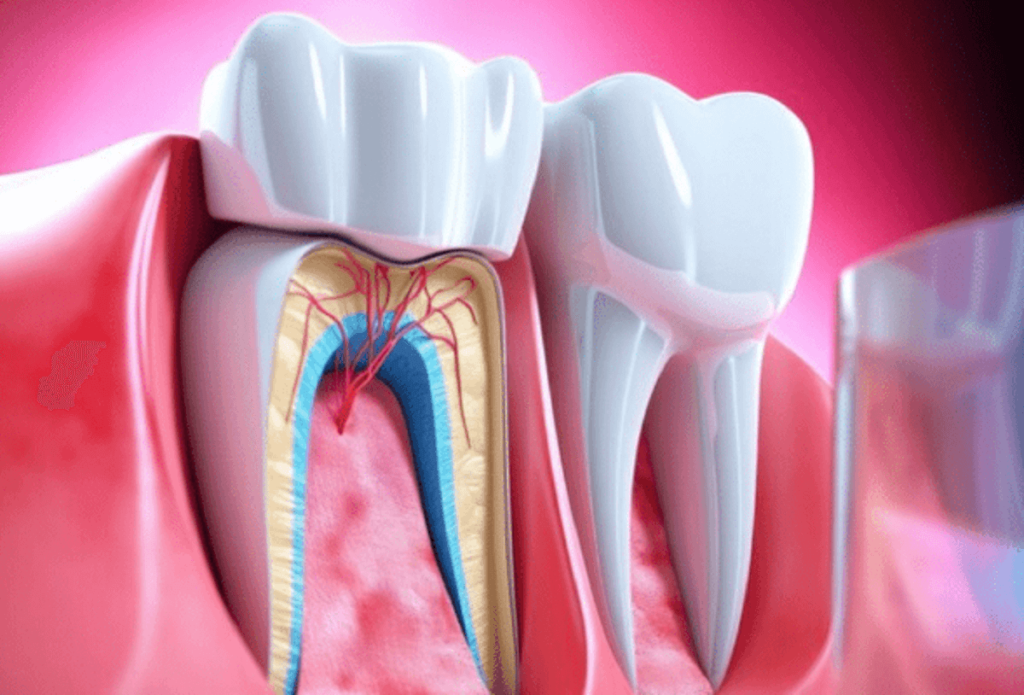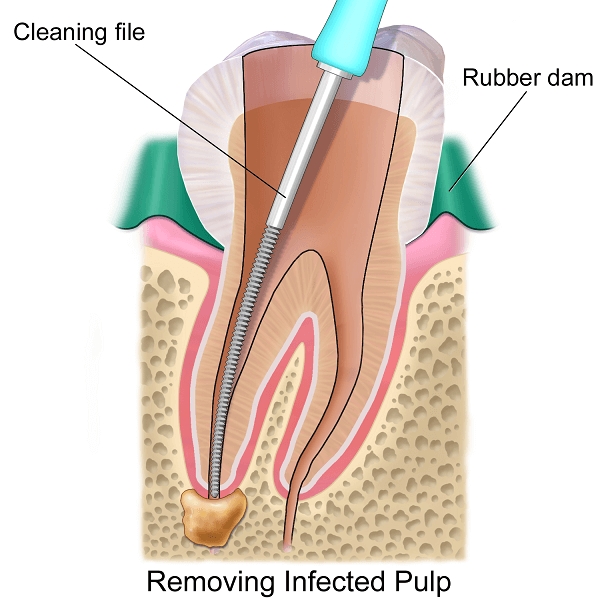Your dentist advised a root canal treatment, and you are becoming anxious about the dental root canal pain and discomfort. You can see great advancements in dentistry and also in anaesthesia. These have made the treatment not only comfortable but also painless.
Undergoing the treatment will make you free from experiencing the throbbing pain every time you eat. But some myths about the pain associated with the treatment are still circulating. Let’s understand the treatment and clear up those myths in this article.
Here, you will learn why you need root canal treatment and the pain associated with it before, during, and after treatment. You will also learn when to seek professional help for pain after a root canal.

Why Do You Need Root Canal Treatment?

Any infection in your tooth pulp, i.e., the tooth’s innermost layer, calls for root canal treatment. Your dentist recommends it only after analysing the cause of dental root canal pain. They will do X-rays with dental X-ray machines to analyse any:
- deep cavity
- inflammation
- damaged tooth
- dead tooth pulp.
Your dentist will remove any infected pulp and seal your teeth after cleaning the root canal. It is needed to prevent any further infection or reinfection and relieves you from the deadly pain.
Pain Before Root Canal Treatment
If you experience a severe toothache, something is wrong with your tooth’s root canals and pulp. You may experience any sensitivity to hot or cold, or your tooth may hurt while biting or chewing.
Whenever you sense any such pain, visiting your dentist at the earliest is necessary. Your dentist will check your mouth to find out the root cause. They can confirm the root canal treatment after analysing the pain symptoms and doing an X-ray.
After a dental checkup, if your endodontist recommends root canal treatment, it is advised to get it done. This will help you get relief from pain while avoiding tooth extraction and retaining your tooth.
Is the Procedure Painless?
Yes, it is pain-free because of local anesthesia. Most importantly, you will be free from the unbearable pain after the root canal that you were experiencing before. The pain in a root canal is only present before treatment from the tooth containing the infection.
For the first few days, you may experience a little discomfort after your root canal process. It is because the surrounding areas and treated teeth are very sensitive at this time. This can also be avoided with the medications provided by your dentist after the dental root canal pain treatment.
Pain Management during the Root Canal Process

Normally you will get rid of unbearable pain within 30 to 60 minutes, as the treatment completes within this time. Whereas more complex cases complete within 90 minutes.
Before treating the dental root canal infection, your dentist or endodontist will numb the infected teeth with local dental anesthesia. When your tooth is numb, there will be no sensation of pain during the process.
A small hole is made in your tooth’s crown to reach the infected tooth pulp. It contains blood vessels, nerves, tooth tissue, and also the bacteria that are causing unbearable pain. All the bacteria, infection, and damaged tooth pulp are removed and cleaned carefully by experts with the help of Aidite dental equipment.
When the infection is removed, your dentist fills the respective hole and seals it with a crown. So you won’t feel any dental crown pain after a root canal. You might sense pressure on your teeth during the process, but there is no pain associated with it.
Feeling sensitivity or tenderness during or after the process for a few days is normal. As said above, it’s just because the area is sensitive after treatment for a few days. But it’s not going to hurt years later, after healing.
Moreover, your dentist will also prescribe antibiotics and medicines to avoid any dental root canal pain after the process.
Pain After Root Canal Procedure: What to Expect?
Although the process is painless and goes smoothly, if not handled professionally, the dental root canal pain can reoccur.
Certain circumstances where your tooth doesn’t heal properly even after root canal treatment are:
- While cleaning the tooth canals, if even the smallest of areas gets accidentally missed, the bacteria settled there can cause infection. Then you will sense dental root canal pain.
- Immediate filling and sealing of the hole is required after the root canal process. Any delay increases the chance of reinfection.
- While filling the hole, your saliva should not reach the tooth. If the bacteria in saliva reaches your tooth before the filling material, it infects the tooth canal and thus causes dental pain after a root canal.
- Proper oral hygiene is the key to a speedy recovery after a root canal. Failing to do so can result in a new cavity on the treated tooth, and as a result, pain.
- If the filling loosens, breaks, or cracks, then also new infection can begin.
- Patients with health issues like a weak immune system dia, diabetes, or autoimmune diseases heal slowly. They are also more prone to reinfection.
How to Stop Throbbing Pain after a Root Canal?
Immediately after the treatment with the best dental equipment from Aidite, you will feel relief. A slight discomfort is normal, but you will not experience severe tooth pain after a root canal when biting.
Tips to Deal with Post Root Canal Pain and Discomfort:
- Do not eat immediately after the procedure.
- For the first few days, avoid chewing with the tooth that has undergone root canal.
- Do not miss the root canal pain medication prescribed by your dentist to reduce swelling or pain.
- You can also try a saltwater gargle to ease any dental pain after root canal.
- While sleeping, elevate your head with pillows.
When to Seek Professional Help When You Have Root Canal Pain
After your root canal treatment, experiencing mild pain or discomfort is normal. It won’t hurt you for more than a few days. The pain or discomfort vanishes when your pulp regains its strength with medications.
But if the dental pain after root canal is not easing up with time, you need professional help. In such cases, root canal treatment demands more cleaning sessions to give you relief from recurring pain.
Once the tooth is treated properly again, a crown is placed over the treated tooth to keep it protected from future damage. However, retreatment is not always the solution.
Sometimes the dental root canal pain you are sensing is just because you are slowly getting used to the crown placed on your tooth. It will improve with medications over time.
But seeking medical help is necessary to avoid any complications later.
FAQ’s
How long does your root canal pain last after treatment?
Dental pain after root canal is temporary and won’t last for more than a few days. Just keep getting the medications on time and avoid any type of hard or crunchy food. Also, don’t chew with the tooth that has gone under treatment as the tooth and pulp there are sensitive.
When does dental pain demand immediate attention?
If your dental pain is not improving with medicines and lasts for more days, then it’s time to visit your dentist. In case of any visible swelling, fever, or infection, a dental checkup or dentist’s visit is a must.
What is the difference between dental root canal pain and other dental issues?
Dental root canal pain is very severe and constant. You can feel it in your infected tooth, jaw, and it can even move to your ear. But the other tooth pains, like cavity pain, bother you while eating or drinking.
Can a tooth that has undergone root canal treatment hurt years later?
If the tooth with a root canal hurts with pressure years later, it could be because of an infection it has caught again. This needs re-treatment to remove any new infection from the tooth.
Does a root canal result in weak teeth after treatment?
Yes, it is because of the removal of pulp. It’s the crown that is placed on the tooth after treatment that helps in strengthening your tooth.
Does a root canal last a lifetime?
With good oral hygiene and proper aftercare of the tooth after root canal treatment, it can last for years.
Summing Up
Dental root canal pain demands timely treatment, else it can lead to an increase in infection and make the case more complicated. You need not worry about any pain as your tooth is numb during the procedure. Moreover, when the professionals use advanced Aidite dental equipment, it makes the process smoother.
Aftercare medications will not let you experience any intense pain after root canal treatment. With proper hygiene and good care, your tooth will regain its firmness. You will start biting and chewing normally in no time after treatment. But delaying the treatment will let you experience only side effects.
Get the treatment on time and keep your teeth healthy by eating healthy food and maintaining good oral hygiene.



